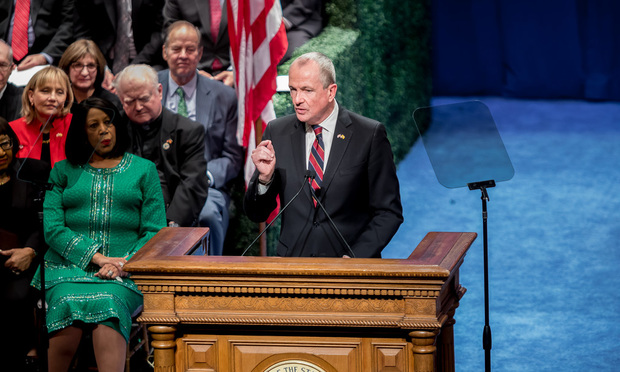Murphy Says 'Life Goes On' After Recreational Marijuana Failure, Backs Renewed Expungement Effort
"I thought it was a very good team effort among the Senate president, the speaker and myself. We didn't quite get there. We had the votes in one chamber. We came close in the other. But life goes on.”
May 15, 2019 at 06:01 PM
4 minute read
 New Jersey Gov. Phil Murphy. Photo: Carmen Natale/ALM
New Jersey Gov. Phil Murphy. Photo: Carmen Natale/ALM
At an event in East Windsor over the 2020 budget late Wednesday afternoon, Gov. Phil Murphy said he had not quite digested everything about Senate President Steve Sweeney's announcement earlier in the day of the recreational marijuana legalization effort's discontinuation for 2019.
Sweeney said lawmakers would suspend efforts to pass legislation legalizing recreational use of marijuana for those 21 and over, but go ahead with bills that seek to expand the state's medical marijuana program and provide for expungement of criminal records for minor marijuana offenses.
“I have a mixed reaction, but I certainly don't disagree with him [Sweeney] on medical marijuana and expungement,” Murphy said at the East Windsor event. “The devil is in the details.”
Murphy said he was surprised that the Senate president cast some blame on him for the recreational marijuana bill's stall.
“That's the first time I've heard him [Sweeney] say that,” Murphy said. “He said to me privately on many occasions that he appreciated enormously my leadership and help on this. I thought it was a very good team effort among the Senate president, the speaker and myself. We didn't quite get there. We had the votes in one chamber. We came close in the other. But life goes on.”
“It's hard to do it legislatively, I admit,” Murphy said on putting recreational marijuana to a 2020 voter referendum. “It's always been a default to go to a referendum and ask the people, but again, I heard this this morning and I am still digesting the pieces.”
Murphy said he was for making the expungement bill separate and maintaining its social justice component.
“I'm not sure what the political calculation is, but I do know this calculation: as long as it's illegal, 600 people a week are going to get arrested and 450 or more of them will be persons of color, that will add to what is already an alarming inequity in our criminal justice system,” Murphy said.
An expungement bill was first introduced in November 2018, though it could be revised, Sweeney said. S-3205, sponsored by Sens. Sandra Bolden Cunningham (D-Hudson), M. Teresa Ruiz (D-Essex) and Sweeney, would:
- Reform the process for expungement of criminal records;
- Expand the categories of people eligible for expungement;
- Establish a “clean slate” expungement to allow someone ineligible under the new provisions to apply for expungement;
- Allow for the expungement of controlled dangerous substance convictions of the third or fourth degree; and
- Allow all convictions for controlled dangerous substance crimes to be treated the same as other crimes and offenses in terms of eligibility for expungement.
Assembly Speaker Craig Coughlin (D-Middlesex) said in a statement that he was pleased that Sweeney plans to act on the expungement legislation.
“Broader regulation around expungement will give thousands of New Jerseyans the opportunity to right the wrongs of the past and clean the slate making it easier to gain employment, buy a home or get a loan,” Coughlin said. “Social justice and social equity have always been the foundation of support for me and my caucus for adult use cannabis. Those issues should not fall by the wayside if we are not able to achieve the votes for adult-use cannabis.”
The medical marijuana bill, S-10, sponsored by Sens. Joseph Vitale (D-Middlesex) and Nicholas Scutari (D-Middlesex) is intended to remove barriers to access for patients and allow physicians and health-care providers to prescribe cannabis for a wider range of conditions. It would:
- Allow for a more extensive list of diagnosed conditions;
- Increase the number of dispensaries;
- Expand the list of professionals who can authorize patient use;
- Increase access to caregivers;
- Increase the amount of cannabis that patients could obtain; and
- Phase out the tax on medical cannabis
This content has been archived. It is available through our partners, LexisNexis® and Bloomberg Law.
To view this content, please continue to their sites.
Not a Lexis Subscriber?
Subscribe Now
Not a Bloomberg Law Subscriber?
Subscribe Now
NOT FOR REPRINT
© 2025 ALM Global, LLC, All Rights Reserved. Request academic re-use from www.copyright.com. All other uses, submit a request to [email protected]. For more information visit Asset & Logo Licensing.
You Might Like
View All

Judge Jablonski and Chief Justice Rabner Both Acted Completely Properly
4 minute read
In 2-1 Ruling, Court Clears Way for Decade-Old Wrongful Imprisonment Suit
5 minute read
Trending Stories
Who Got The Work
J. Brugh Lower of Gibbons has entered an appearance for industrial equipment supplier Devco Corporation in a pending trademark infringement lawsuit. The suit, accusing the defendant of selling knock-off Graco products, was filed Dec. 18 in New Jersey District Court by Rivkin Radler on behalf of Graco Inc. and Graco Minnesota. The case, assigned to U.S. District Judge Zahid N. Quraishi, is 3:24-cv-11294, Graco Inc. et al v. Devco Corporation.
Who Got The Work
Rebecca Maller-Stein and Kent A. Yalowitz of Arnold & Porter Kaye Scholer have entered their appearances for Hanaco Venture Capital and its executives, Lior Prosor and David Frankel, in a pending securities lawsuit. The action, filed on Dec. 24 in New York Southern District Court by Zell, Aron & Co. on behalf of Goldeneye Advisors, accuses the defendants of negligently and fraudulently managing the plaintiff's $1 million investment. The case, assigned to U.S. District Judge Vernon S. Broderick, is 1:24-cv-09918, Goldeneye Advisors, LLC v. Hanaco Venture Capital, Ltd. et al.
Who Got The Work
Attorneys from A&O Shearman has stepped in as defense counsel for Toronto-Dominion Bank and other defendants in a pending securities class action. The suit, filed Dec. 11 in New York Southern District Court by Bleichmar Fonti & Auld, accuses the defendants of concealing the bank's 'pervasive' deficiencies in regards to its compliance with the Bank Secrecy Act and the quality of its anti-money laundering controls. The case, assigned to U.S. District Judge Arun Subramanian, is 1:24-cv-09445, Gonzalez v. The Toronto-Dominion Bank et al.
Who Got The Work
Crown Castle International, a Pennsylvania company providing shared communications infrastructure, has turned to Luke D. Wolf of Gordon Rees Scully Mansukhani to fend off a pending breach-of-contract lawsuit. The court action, filed Nov. 25 in Michigan Eastern District Court by Hooper Hathaway PC on behalf of The Town Residences LLC, accuses Crown Castle of failing to transfer approximately $30,000 in utility payments from T-Mobile in breach of a roof-top lease and assignment agreement. The case, assigned to U.S. District Judge Susan K. Declercq, is 2:24-cv-13131, The Town Residences LLC v. T-Mobile US, Inc. et al.
Who Got The Work
Wilfred P. Coronato and Daniel M. Schwartz of McCarter & English have stepped in as defense counsel to Electrolux Home Products Inc. in a pending product liability lawsuit. The court action, filed Nov. 26 in New York Eastern District Court by Poulos Lopiccolo PC and Nagel Rice LLP on behalf of David Stern, alleges that the defendant's refrigerators’ drawers and shelving repeatedly break and fall apart within months after purchase. The case, assigned to U.S. District Judge Joan M. Azrack, is 2:24-cv-08204, Stern v. Electrolux Home Products, Inc.
Featured Firms
Law Offices of Gary Martin Hays & Associates, P.C.
(470) 294-1674
Law Offices of Mark E. Salomone
(857) 444-6468
Smith & Hassler
(713) 739-1250






